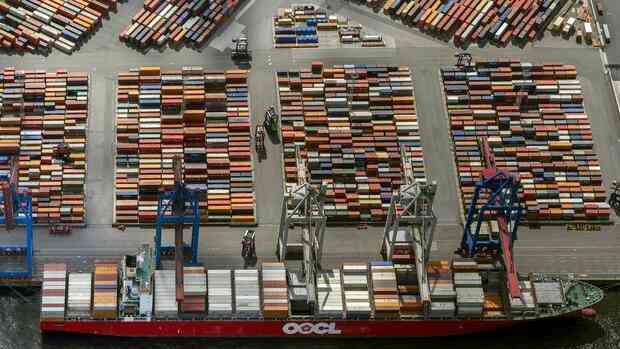Goods subject to EU sanctions are exported “to a considerable extent” from the EU and thus also from Germany to certain third countries and from there to Russia.
(Photo: imago/Hans Blossey)
Berlin The Federal Ministry of Economics wants to make it more difficult to circumvent the economic sanctions against Russia. Foreign trade data indicate that goods subject to EU sanctions are exported “to a considerable extent” from the EU and thus also from Germany to certain third countries and from there to Russia, according to a paper from the house of department head Robert Habeck (Greens). , which was presented to the Handelsblatt in Berlin on Thursday. RTL and N-TV had previously reported about it.
“We must work together to oppose these circumvention activities more effectively than before, at national and EU level.” This should be the focus of an eleventh package of sanctions.
The ministry will do this in close coordination with the other departments of the federal government. The paper lists several measures, these are the four most far-reaching:
- Habeck wants to make companies more responsible. For example, exports to certain third countries should only be possible if transparent “end-use declarations” are submitted as part of the export declaration. “This applies to all sanctioned goods that are of importance to the Russian war machine. We are committed to this at EU level and are adapting the national regulations,” says the ministry paper. Deliberate misrepresentation should in future be a criminal offense throughout Europe.
- In addition, the ministry wants to gain the support of as many states as possible in order to increase the effectiveness of the sanctions. To this end, diplomatic efforts should be stepped up with the new EU sanctions coordinator and international partners. The abolition of tariff relief could give incentives to cooperate to countries that have not cooperated so far.
- Habeck also wants to propose a new criterion to the EU that would allow people and companies to be sanctioned simply for the reason that a European product is passed on to Russia via a company in a third country.
- The evasion of sanctions should also be punished more severely. In Brussels, for example, they are working to “exclude certain companies from third countries as recipients of sanctioned goods”. In addition, the federal government wants to promote indications of sanctions violations more. To this end, the EU sector sanctions are supplemented with an information disclosure obligation that is aimed at everyone. Anyone who has “information relevant to sanctions” must report it to the authorities.
Russian imports from China and India increased significantly
Since Russia’s war of aggression against Ukraine began almost a year ago, the EU has launched nine sanctions packages against Russia. The tenth is in the final deliberations.
But the Russian economy is surprisingly resilient, also because Russia has managed to establish new trade relations. “Russia is actively circumventing our sanctions,” EU Commission Vice President Valdis Dombrovskis recently admitted.
According to the statistics authority Eurostat and the Bruegel Institute in Brussels, Russian imports from the EU fell from eight billion dollars in January 2022 to five billion dollars in November 2022. On the other hand, Russian imports from China, India and other Asian countries rose significantly. Imports from China, for example, grew from $7.7 billion to $10.5 billion in the period, those from India from $1.1 billion to $4.6 billion.
Habeck’s ministry wants to gain the support of as many states as possible in order to increase the effectiveness of the sanctions.
(Photo: dpa)
This does not mean that the sanctions are ineffective. But Western hopes that the Russian troops would run out of supplies have not been fulfilled. “Russia is adapting, turning its economy into a war economy, ramping up military production and preparing for the sanctions,” according to a new study by the German Council on Foreign Relations (DGAP).
A number of neighboring countries are helping the Russians in this. They have apparently discovered a lucrative business: their companies buy Western goods and sell them on to Russia, which is ostracized by the West.
Such an intermediate trade can be observed in Turkey or Armenia, for example, says Tobias Gehrke from the European Council on Foreign Relations (ECFR) think tank. “Suddenly these countries are exporting things that they don’t even produce themselves.” The diversion of trade flows helps the Kremlin to keep its war machine running.
With agency material
More: The true state of the Russian economy
